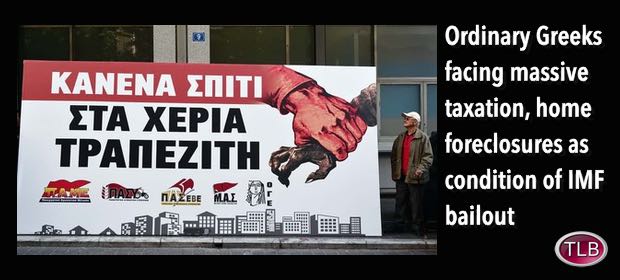
Now they take even the homes from Greeks! The crimes of IMF, Germany and EU
DEFEND DEMOCRACY PRESS
The warning came despite the recent positive messages emanating from Brussels and Washington that Greece is making progress in the review and is on course to reach an agreement with creditors on a technical level by the end of the year.
But lenders appear adamant that the review’s conclusion will be jeopardized if foreclosures do not take place as scheduled and if notaries, who have borne the brunt of attacks by anti-establishment groups and protesters, are not protected.
“If the Greek government has the will to protect notaries, it will find the way to achieve this,” a source told Kathimerini, adding that “if they want to stop the violence they can do it.”
The sources told Kathimerini they expect to see foreclosures beginning on November 27 “at all banks and throughout the country and not just isolated cases.”
Auditors have repeatedly made it clear that the resumption of foreclosures, which have dragged during the crisis years due to strikes by lawyers and notaries and more recently due to anti-austerity protesters, is a prerequisite for the successful conclusion of Greece’s current bailout review.
The ultimatum, however, appears to have motivated the government to take action so that foreclosures resume and notaries are protected as sources said that all necessary measures will be taken to “ensure strategic debt defaulters do not hide behind the attacks against notaries.”
To this end, Justice Minister Stavros Kontonis met with representative of the notaries’ union of Athens, Piraeus and the Aegean and Dodecanese islands and agreed on a set of measures to protect notaries.
The presence at the meeting of Alternate Citizens’ Protection Minister Nikos Toskas and Deputy Minister to the Prime Minister Dimitris Liakos was seen as a further indication of the importance the government has attached to the issue – after long being accused of looking the other way.
For his part, Finance Minister Euclid Tsakalotos underlined the importance of foreclosures in the effort to deal with the problem of nonperforming loans during a speech Wednesday to the parliamentary group of ruling SYRIZA
From an article in the Greek “Kathimerini” newspaper
Original article
************
Greece’s middle incomes go under knife
The disposable income of Greece’s average earners has been slashed by more than 50 percent due to overtaxation in recent years, according to the latest data examined by Kathimerini, which also paints a grim picture for the coming years.
What’s more, the reduction of the income tax threshold is expected to further impact the disposable income of households. Brussels expects Greece’s primary surplus to beat its target of 3.5 percent of GDP again next year, rising to 3.9 percent, and then to 3.7 percent in 2019. However, the primary surpluses Greece has posted in the last two years are largely due to exorbitant taxes rather the result of growth.
Moreover, while the European Commission’s statistics point to a disproportionate increase in taxation in Greece, at a time when the economy was shrinking, the country’s industrialists and political opposition say overtaxation has led to more tax evasion and the failure of the tax system.
Those hardest hit have been freelance professionals, who since 2009 have been subjected to unprecedented raids by the tax office, and more recently by social insurance contribution hikes, resulting in the gradual exhaustion of their income.
And high taxes, including property taxes, are the reason why both freelancers and self-employed professionals submitted incomes last year that were 20 percent lower than their actual earnings.
A telling example of overtaxation concerns freelance professionals who own a car and an apartment and earn 50,000 euros a year:
In 2009 they had to pay 16,333 euros of their annual income to the tax office and their social security fund, leaving them with a net income of 33,667 euros. Five years later, their clear income dropped by a further 4,344 euros to 29,323. The situation today is even more dire as the same self-employed professional making 50,000 euros must pay 32,151 euros in taxes and contributions, leaving them with a disposable income of 17,849.
Taxes and social security contributions have rocketed by 96.8 percent since 2009, while compared to 2014 they have risen by 55.5 percent.
Furthermore, today’s disposable incomes – after taxes and contributions are deducted – have far less purchasing power compared to 2009, as direct taxes in almost all categories – VAT and special consumption taxes – have risen.
Original article
ER recommends other articles by Defend Democracy Press and Ekathimerini.com
Featured image: ‘A protester stands by a banner reading ‘No house in the hands of bankers’ in Athens. Photograph: Louisa Gouliamaki/AFP/Getty Images





